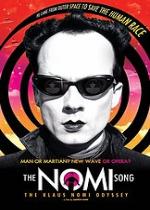
Knight at the Movies ARCHIVES
Emotional Aliens:
Mysterious Skin, The Nomi Song
6-1-05 Knight at the Movies column
By Richard Knight, Jr.
Mysterious Skin, The Nomi Song
6-1-05 Knight at the Movies column
By Richard Knight, Jr.


Araki's dark masterpiece, the man from another planet
Mysterious Skin, the first film from writer-director-producer-editor Gregg Araki in five years is a dark masterpiece. I’ve not been a
huge fan of Araki’s since his queer cinema breakthrough The Living End (a scene of Matt Keeslar and Johnathon Schaech cuddling
together at one point during 1999’s Splendor notwithstanding). But this is the first Araki film of material he didn’t originate (the
movie’s based on the 1995 novel by Scott Heim) and perhaps the distance of adapting someone else’s work has made the overall
difference. Whatever the reason, Araki’s movie is unforgettable, filled with sequences that are almost unbearable in their conjoined
malevolence and exquisiteness.
Focusing on the seemingly disparate lives of Neil and Brian, two teenagers in Hutchinson, Kansas, the film doesn’t waste time and
heads for the dark waters within minutes of its dreamy, opening credits in which we see the then 8 year-old Neil laughing and happy
as a rain of Fruit Loops showers down on him. When the theme of the movie – the long term, horrendous effects of child
molestation – quickly presents itself just moments later, a queasy feeling of dread overtakes you. What happens to Neil and Brian
is more horrible than the killer zombie movies that both are shown watching at various stages of their lives as the film progresses.
But like some of the more lyrical horror classics (DePalma’s Carrie and The Fury come to mind), the movie is so gorgeously shot and
scored (by ambient music giants Harold Budd and Cocteau Twins guitarist Robin Guthrie) that the combination of beauty and
revulsion have a trance-like effect. The last long scene in particular is a bravura piece of writing, acting, and directing. Araki does a
wonderful job balancing the unbearably painful loss of innocence with humor and fresh detail. At the conclusion of the film I clung to
the small ray of light that the director offered (I experienced the same feeling at the end of the Jonathan Caouette’s searing
documentary Tarnation).
As the 8 year-old Neil (Joseph Gordon-Levitt) and Brian (Brady Corbet) grow into troubled teens and then young adults, each has a
very different way of coping with their childhood horrors at the hands of their little league coach (the terrifying, sunny and magnificent
Bill Sage). Neil, the son of a loving but distracted single mother (played with sass by Elisabeth Shue), is hustling in the
neighborhood park by the time he’s 15 and bragging about his gay conquests. The quiet nerd with the glasses, Brian, however, is at
the opposite end of the scale (and it’s never clear if he’s gay). Though his mother is overprotective in the extreme and he is
constantly fussed over, he remains convinced that he’s been abducted by aliens because he’s had blackouts as a child and can’t
remember what happened. As Brian grows up his obsession intensifies until he’s briefly drawn into a friendship with the loony Alvana
(Mary Lynn Rajskub), who also believes she’s been abducted by aliens.
At one point, Neil heads to New York to visit his close gal pal Wendy who warns him that “You’re not in Kansas anymore” and to play
safe and watch out. Hustling in the Big Town is very different than hustling in Kansas as Neil quickly finds out. The picture’s theme
of simultaneous revulsion-fascination is again present in a scene where Neil is picked up by perhaps the creepiest John ever
recorded on film (and who better to play him than Billy Drago from The Untouchables) that surprisingly ends on a compassionate note.
The film builds to the eventual meeting of Neil and Brian who have not seen each other since their terrible encounter and it is this
last incredible sequence, as noted, that finally offers a chance at emotional redemption – for both the characters and the audience.
An exquisitely textured performance by Gordon-Levitt as Neil is a standout among an expertly directed cast. All the more interesting
when one contrasts this with Gordon-Levitt’s work last year as the conservative Mormon in the gay themed Latter Days.
+++++++++++++++++++++++++++++++++++++++++++++++++++++++++++++++++++++++++++++++++++++++++++++
Looking like an alien and singing like a diva, Klaus Nomi was one of the early 1980s most profoundly bizarre performers. But, as
The Nomi Song, a documentary on the life and music of the king of alien androgyny reveals, offstage he was a sweetie pie who
loved baking pies for everyone (as I can attest, having met him when he toured Chicago) and just wanted to find the right guy and
settle down. Upon arriving in New York from Germany the opera trained Klaus Sperber quickly morphed into Klaus Nomi The Thing
From Another World. His story is told by several of the brighter lights of the “No Wave” movement, performance artist Ann
Magnuson and pop artist Kenny Scharf among them. Anyone interested in the early 80s avant garde new wave scene will identify
with the alternate hokum and fragile beauty of the period that seemed to co-exist most profoundly in this strange little guy.
Director Andrew Horn has collected a lot of grainy performance video footage and integrates it with old sci-fi clips that emphasize
Nomi’s alien persona. Horn also comes up with inventive artistic solutions that keep the film from being just one talking head after
another. In just one creative example, we hear Nomi’s German aunt and guardian, Trude Sperber, in voice over while watching a
paper doll cut out of her placed in a fully furnished doll house living room (and later garden).
When I first saw The Nomi Song last year during the Chicago film festival I pointed out that although Nomi’s fellow performer Joey
Arias is glimpsed several times in the performance footage, others mention his closeness to Nomi, and he is thanked in the credits
as the executor of Nomi’s estate, he doesn’t appear on camera and I was disappointed by that. I suggested that he could have filled
in many more personal details but a second viewing has convinced me that leaving the chatty Arias out of the interviews helps to
leave Nomi’s mystique intact. I’d also forgotten the powerful footage of Nomi’s performance (in red velvet Hamlet costume) of
Purcell’s “The Cold Song” aria with an orchestra in Europe that he gave a few years before his death in 1983 during the first wave of
the AIDS plague. Nomi always seemed a one trick pony to me, albeit a really creative, interesting one but that concert aria
performance certainly pointed in a direction that would have brought him great acclaim years after the silliness of synth pop faded.
